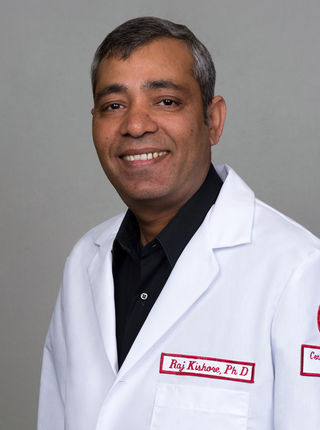About the Chair
The Chair of the Department is Raj Kishore, PhD, FAHA, the Laura H. Carnell Professor in Cardiovascular Sciences. An internationally known heart researcher and leading authority on heart injury and repair, Dr. Kishore is best known for pioneering and advancing the studies on the role of Interleukin-10 in the regulation of post-injury cardiac inflammation. His lab additionally pioneered the role of stem cell-derived extracellular vesicles as cell-free modality for cardiac repair.
A native of Lucknow, India, Dr. Kishore earned his undergraduate degree in Biology and PhD in Immunology and Medical Genetics from University of Lucknow in India. He moved to United States for postdoctoral training and trained under imminent cardiovascular scientist, Dr. Douglas Losordo at Tufts University in Boston where he obtained his first faculty position. Dr. Kishore moved to Northwestern University in Chicago in 2007 and rose through the ranks and was granted tenure in 2012. In 2014 he was recruited to Katz School of Medicine, Temple University as Tenured Professor of Pharmacology and Medicine and Professor and Director of Stem cell Therapy program at the Center for Translational Medicine. Prior to his appointment as Chair of Department of Cardiovascular Sciences, Dr. Kishore also served in several leadership roles including Associate Director of Center for Translational Medicine since and Vice Chair of DCVS. For close to 20 years, Dr. Kishore’s research program is well funded by NIH and American Heart Association totaling over 35 million dollars, and he has authored over 150 manuscripts, most of them in leading Journals and his scientific work is highly cited. Dr. Kishore has also mentored over two dozen scientists and many of his trainee are independent faculty throughout the country.
A Fellow the American Heart Association, International Society for Heart Research and International Academy of Cardiovascular Sciences, Dr. Kishore has received numerous honors and awards and served on many leadership committees of the American Heart Association, multiple peer-review committees of NIH and AHA and on scientific journals’ editorial boards.
“It is my privilege to represent extraordinary group of scientists in the Department of Cardiovascular Sciences and I am committed to fostering an environment where science, collaboration and scholarship flourish and take our already successful program to the next level,” says Dr. Kishore.
